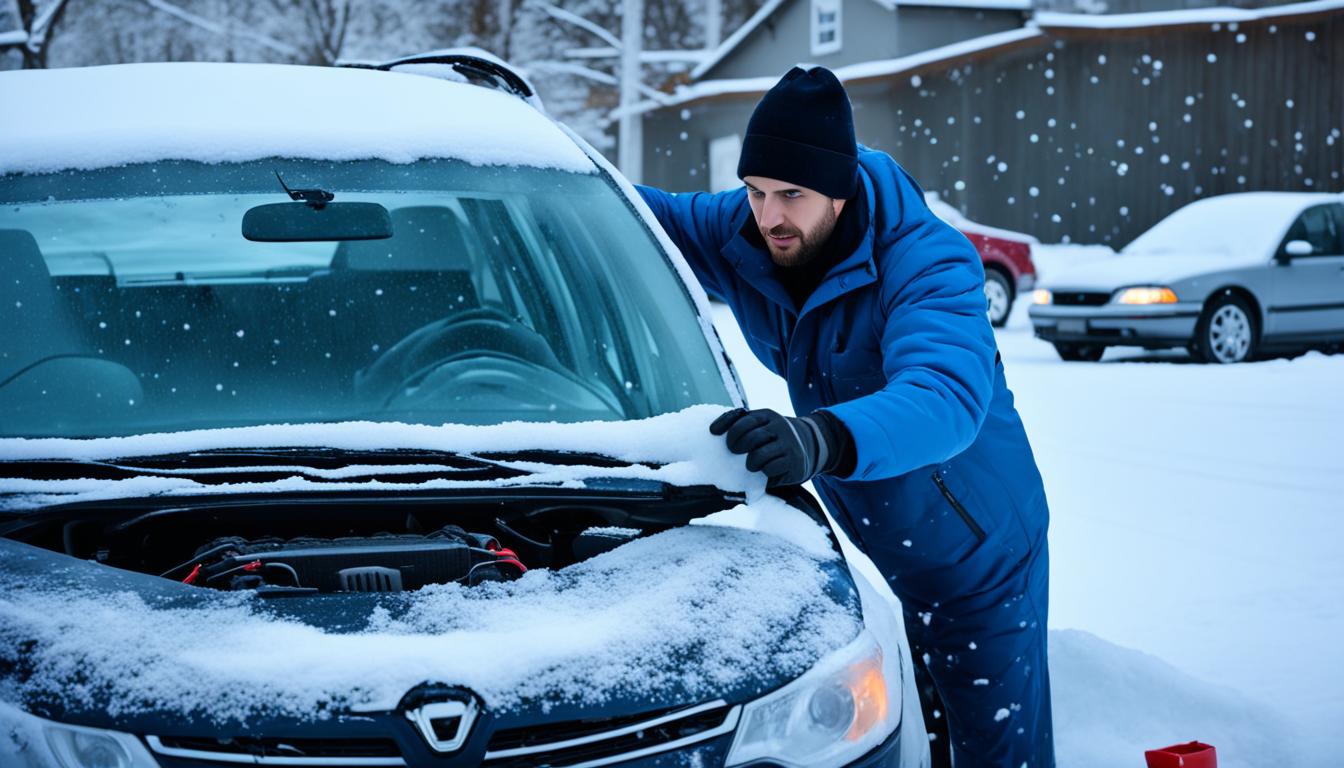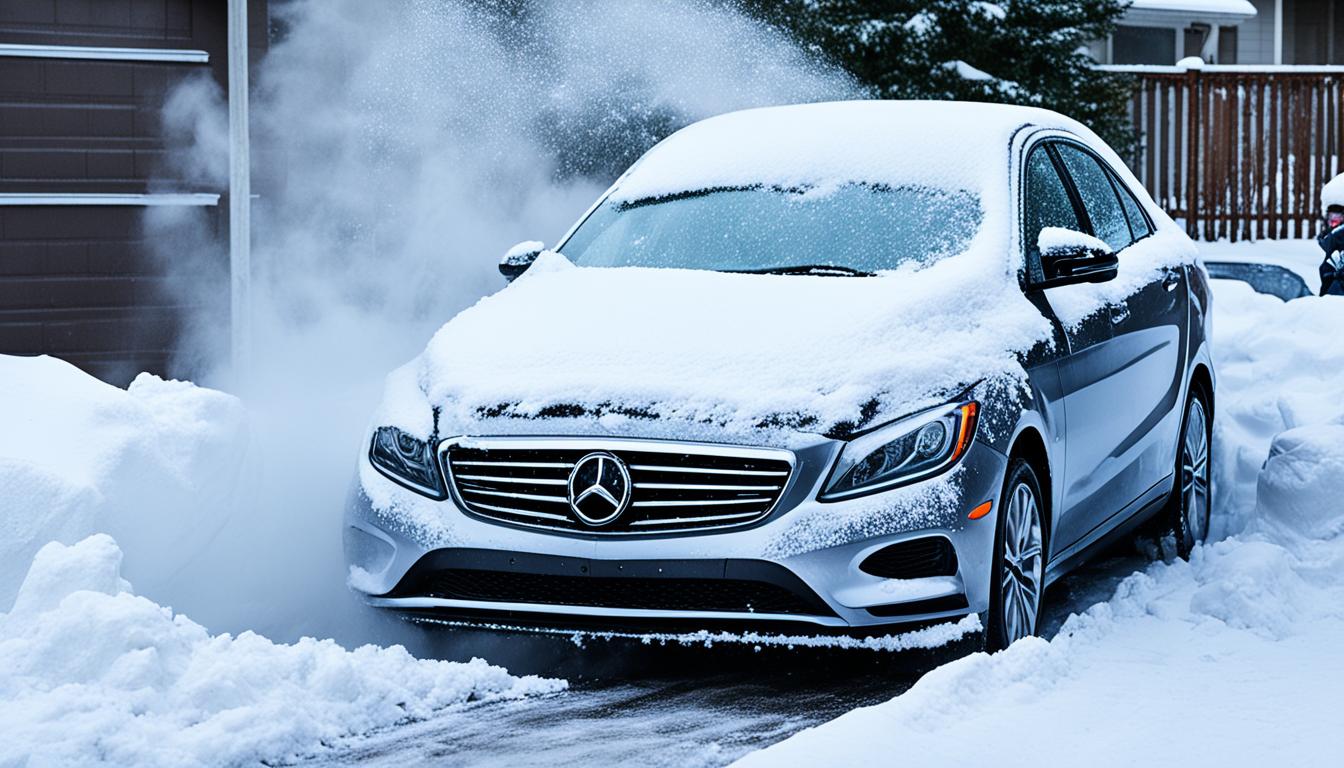Prepare Car Winter

7 Essential Steps to Prepare Your Car for Winter
In Canada, winter driving requires some preparation to ensure safe and stress-free road trips. Did you know that an average of 25% of all car accidents in Canada occur during the winter months? Properly preparing your car for the cold weather can significantly reduce the risk of accidents and breakdowns, keeping you and your loved ones safe on the road.
Don't worry, we've got you covered! Here are seven essential steps to get your car ready for winter, recommended by experts:

Key Takeaways:
- Winter driving in Canada accounts for 25% of all car accidents.
- Properly preparing your car for winter reduces the risk of accidents and breakdowns.
- Follow these essential steps recommended by experts to get your car ready for the cold weather.
Importance of Winterizing Your Car
When winter arrives, it's crucial to take the necessary steps to protect and prepare your car for the cold weather. Winterizing your car not only helps prevent common issues such as no-starts and frozen doors and windows, but it also ensures your safety on the road.
One of the main concerns during winter is the possibility of engine freeze-up. This can happen when the coolant in your car's engine freezes, resulting in severe damage and potentially expensive repairs. By winterizing your car, you can ensure that your engine is protected from freezing temperatures.
In addition to engine freeze-up, winter driving conditions can also lead to accidents if your car is not properly prepared. Slippery roads and reduced visibility due to snow or ice can make driving hazardous. However, by following a winter car maintenance routine, you can enhance your car's traction, visibility, and overall performance on winter roads.
"Proper winterization of your car is essential for your safety and the longevity of your vehicle. Taking extra precautions during the colder months will give you peace of mind and help you avoid potential problems on the road."
Here are some additional tips to ensure a smooth and safe winter driving experience:
- Check your tires: Ensure that your tires have adequate tread depth and are properly inflated. Consider switching to winter tires for improved traction on icy or snowy surfaces.
- Inspect your battery: Cold weather can be tough on your car's battery. Have it tested to ensure it is in good condition and replace it if necessary.
- Check your fluids: Make sure your car has sufficient levels of antifreeze, windshield washer fluid, and oil. Using the correct viscosity of oil for cold weather is essential for optimal engine performance.
- Replace worn wiper blades: Clear visibility is crucial during winter driving. Replace old or worn wiper blades to ensure a clean and streak-free windshield.
- Prepare an emergency kit: In case of an unexpected breakdown or emergency, keep a winter car kit in your trunk. Include items such as a blanket, flashlight, jumper cables, and a small shovel.
By staying on top of winter car maintenance and taking the necessary steps to winterize your car, you can enjoy a safe and worry-free driving experience throughout the winter season.

Additional Winter Car Maintenance Tips
Winter can be harsh on your car, but with proper maintenance, you can ensure a safer and more reliable driving experience during the cold months. Here are some additional tips to keep your vehicle in top shape this winter.
1. Check your tires regularly: Cold weather can cause a drop in tire pressure, so make sure to check it at least once a month. Also, consider switching to winter tires for better traction on snow and ice.
2. Keep your windshield clear: Visibility is crucial for safe driving, so regularly clean both the inside and outside of your windshield. Use a winter-grade windshield washer fluid to prevent it from freezing.
3. Maintain your battery: Cold weather can put additional strain on the battery, so ensure it's in good condition. Clean any corrosion on the terminals and consider having it tested at your local mechanic if it's more than three years old.
4. Protect your car's exterior: Salt and road grime can cause damage to your car's paint and undercarriage. Regularly wash your car, paying extra attention to the undercarriage, to protect it from corrosion. Consider applying a coat of wax to provide an extra layer of protection.
5. Check your lights: Days are shorter during winter, and adequate lighting is crucial for visibility. Regularly inspect your headlights, taillights, and turn signals to ensure they're working properly. Replace any bulbs that are dim or burnt out.
Remember, a well-maintained car is less likely to encounter issues on the road. By following these additional winter car maintenance tips, you'll be better prepared to face the challenges of the winter season and ensure a safer and more enjoyable driving experience.
